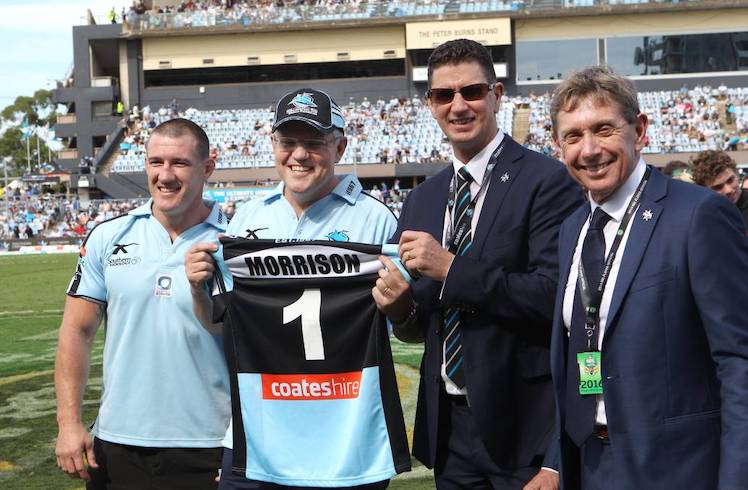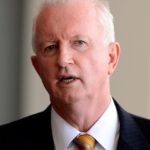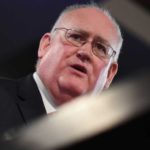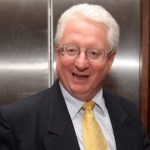Is Scott Briggs – Scott Morrison mate, Liberal staffer, News Corp lobbyist and Packer empire crisis consultant – now the front-runner to win the Government’s billion-dollar privatisation of Australia’s visa system? Or is it his rival suitors from Accenture and Australia Post, a consortium packed with Liberal Party identities? Michael Sainsbury and Michael West investigate the political and business connections behind this bumper taxpayer-funded prize.
Despite the myriad failures of privatisation, not least the disastrous sale of the nation’s energy networks, which has delivered dazzling profits to foreign multinationals at the expense of every citizen in this country, the Government has pledged to auction yet another essential service, visa processing.
Media coverage of this proposal has been quite muted, especially in light of the poor track record of the Coalition Government in delivering big-ticket information technology projects and rising concerns about the ability of the bureaucracy to provide secure cyber platforms. Key examples are the failure of the 2016 Census platform delivered by IBM and the more than one million Australians opting out of the digital health records plan, MyHealth. Ironically, MyHeath was provided by Accenture, one of the two bidders for the visa deal.
Two Senate inquiries were announced on August 1. The first concerns service delivery in the visa and citizenship system Centrelink’s Robodebt, and the second on the government consulting bonanza and the Big Four audit firms. These followed a chorus of agreement between Labor, the Greens and the cross-bench and may mean a temporary interruption to plans to privatise visa processing.
Yet, the privatisation of visas has the weight of money behind it, and a veritable gravy train of consultants and business interests to give it momentum. The value of the contract is commonly tipped as $1 billion with some estimates as high $3 billion.
The plan to outsource visa processing has been on foot since 2017. Part of a “once-in-a-generation IT platform overhaul”, it is designed to process about 90 per cent of all visa applications. The growth outlook is appetising for investors. Visa applications are expected to grow from 8.7 million in 2016-17 to 13 million by 2026-27.
Mind you, there is no model for it. In the UK, where the visa system has been privatised, there are rising calls from MPs and lawyers concerned about the rampant profiteering of visa operators and their exploitation of vulnerable people. International precedent, in other words, is not favourable for outsourcing visas.
The Sharkies Connection
This story examines the private interests who stand to benefit from the proposal. Let’s begin with those closest to the top of Australian politics. A company chaired by Scott Briggs, who is a friend of the Prime Minister, director of the Cronulla Sharks rugby league club and Liberal Party heavyweight, is one of the prime movers behind one of two consortia. Briggs is well connected, though not well known.

Scott Morrison being presented with the no1 supporter jersey by former club chairman Damian Keogh, former CEO Lyle Gorman and club captain Paul Gallen. Picture: John Veage.(Image courtesy https://www.theleader.com.au/)
Another Briggs company was engaged by embattled Crown Resorts for crisis management advice after 19 of its employees of the Packer family business were detained in China in 2016.
Briggs’ bidding vehicle for visas is Australia Visa Processing Australia Pty Ltd (the “AVP” bid). The rival bidder is a consortium of global IT consulting giant Accenture and Australia Post.
Murdoch and Packer nexus
While the bid by Accenture and Australia Post offers two reassuringly familiar names, Scott Briggs’ AVP is a new player in the booming government outsourcing game. Both bidders host a web of connections to the Liberal Party, Prime Minister Scott Morrison, his predecessor Malcolm Turnbull and the Packer and Murdoch business empires.
The drive to privatise visas has been hampered in recent weeks following admissions by the Government that it had deals with the scandal-plagued Crown Resorts and other corporations to fast track visas; in Crown’s case it was for Chinese high rolling gamblers.
After the Crown crisis broke, in 2016, when 19 of its employees were detained in China, it brought in Pace First, a pan-national crisis management that is chaired by Briggs, to protect Crown’s brand.
“We help clients understand and manage their unique risk profile, regulatory requirements and geographic exposures to anticipate possible disruptions and impacts, plan response and recovery strategies and understand the full context of consequences at every level of an organisation — from site to the boardroom,” Pace’s website states.
AVP was registered with the Australian Securities and Investments Commission (ASIC) in September 2016. Searches show it has brought together some well known as well as mysterious Sydney business interests. Sydney lawyer Scott Briggs is formerly Honorary Treasurer of the NSW branch of the Liberal Party. Briggs ran Malcolm Turnbull’s successful bid to beat sitting member Peter King for pre-selection for the seat of Wentworth in 2004.

Anthony Tripodina
He has also worked for Turnbull in finance and for both James Packer and Rupert Murdoch. His company Pacific Blue Capital holds 19.9 per cent of AVP. Pacific Blue also lists as a director and shareholder the young Sydney real estate agent Anthony Tripodina.
Besides Briggs and Tripodina, other AVP directors and shareholders include former Foxtel chiefs Peter Tonagh, and Kim Williams and Kim Williams’ wife Catherine Dovey, long-time Packer family advisor Ashok Jacob, Sky News host and former Labor party Senator Stephen Conroy and secretive Sydney property group Toga Investments.
Among other key shareholders there’s the scandal-prone National Australia Bank’s NAB Ventures, as well as Qantas Ventures. AVP’s registered offices are at a small suite in Sydney’s Australia Square Tower.
Rise of the mega-consultants
The company’s share register also includes PwC Nominees and while this nominee company appears to have been deployed to hold shares for other investors, reports in The Australian Financial Review suggest PwC is an investor in its own right, as well as a key advisor. PwC partner, Sammy Kumar, is a director of AVP.
The interesting thing here is that rival bidder Accenture is not merely an adviser but also a major investor. Both PwC and Accenture are among the biggest beneficiaries of Australian government contracts, earning billions of dollars in recent years. This brings us to an interesting development; the status of these mega-consultancies as, not just advisers, but bidders for public assets in their own right.
This, at a time when the Senate has just announced an inquiry into poor audit standards and conflicts of interest by the Big Four: PwC, KPMG, EY and Deloitte.
Here is the Committee line up for Senate Inquiry into Big4 audit (and their tax and consulting conflicts). We will be calling for a break up. Submissions can be confidential https://t.co/5aZN5EUQGG#auspol #ausbiz
— ?Michael West (@MichaelWestBiz) August 12, 2019
One news report mentioned that three of PwC’s partners, including chief executive, Luke Sayers, and fellow partners Tony Peake and Kuman, held personal interests in AVP but had been forced to divest them.
Rise of the lobbyist

David Coleman, Minister for Immigration
Scott Briggs is also a friend of the Government’s low profile Immigration Minister David Coleman. Briggs and Coleman are former colleagues who worked together at Nine Entertainment. It should be noted however that the visa project was already underway, and Scott Briggs had formed his consortium, when Coleman was surprisingly handed the junior Home Affairs ministry by Malcolm Turnbull in the 2017 cabinet reshuffle, in a bid to provide some check on the power of his rival, Home Affairs Minister Peter Dutton.
Coleman quickly recused himself from any involvement in the visa processing contract in 2018 which is now being looked after in Peter Dutton’s office. Scott Morrison, after some time, followed suit.
In 2014, Fox Sports chief (now Foxtel CEO), Patrick Delaney, brought Scott Briggs in from Nine to work on government relations. Nine chief David Gyngell was said to be unhappy at his poaching at the time. Briggs had previously also worked for James Packer’s Publishing and Broadcasting Limited.
It is understood that Scott Briggs’ main job was as a lobbyist, focused largely on the anti-siphoning laws which keep major sports events on free to air television, laws which Foxtel has perennially tried to have lifted or at least watered down.
Colleagues described Briggs as someone who did not socialise much with workmates and who was secretive, and while he had a significant say in major divisions such as budgets and group strategy, the nature of his role in the Murdoch empire is not well documented. Others said that he remained close to people at Nine.
The last quango in Canberra
Looking at the rival bid, there are a number of Liberal Party connections, and a greater diversity of interstate operators, from WA to Queensland, as well as NSW and Victoria. Accenture is bringing its IT consulting expertise to the party, and Australia Post its broad network for distribution.
Four of the directors on the board of Australia Post are Liberal Party figures past and present. Tony Nutt was former Prime Minister John Howard’s personal private secretary for a decade, state director of the NSW, Victorian, South Australian and West Australian branches of the party and its federal director through the 2016 election.

Bruce McIvor
Bruce McIver is a former national vice-president of the Liberal Party. Deirdre Willmott is a former chief of staff for Liberal premiers in Western Australia. Michael Ronaldson was a Liberal Party senator for Victoria.
The Australia Post board’s Liberal Party connections cover most of the country, largely due to the fact that, like the National Broadband network, its board was reconstituted – and stacked with mates – by Malcolm Turnbull from 2013 when he took over as Communications Minister. Turnbull’s work was continued by his successor Mitch Fifield, himself appointed by Turnbull after he rolled Tony Abbott in 2015. Australia Post directors currently take home $93,000 a year.
The Liberal Heavyweight

Tony Nutt
The heavyweight on the list is Tony Nutt, who was appointed by Fifield in May 2018 and is a former adviser to John Howard. Nutt has run the party at both federal and NSW levels, as well as being a loyal foot soldier to Tony Abbott who rose to be Cabinet Secretary. He even did a stint with short-lived Victoria Premier Ted Baillieu and was also in charge of Scott Morrison’s transition into government after this year’s election.
Melbourne lawyer, former Senator Michael Ronaldson, was appointed by Fifield in March 2016 and had his term extended for another three years this year. He is no slouch in the political experience department either, having been a Federal Liberal lower house MP from 1990-2001 and then Senator for the state between 2004-2013 and once served as junior transport minister.
Trucking industry veteran, Bruce McIver, was appointed by Mitch Fifield in December 2015 but was certainly identified by Turnbull who had only recently become PM. He has been a very loyal servant to the party as the inaugural President of the Liberal National Party of Queensland from from 2008 until his retirement only three months before his elevation to the Australia Post board.
During this time, McIvor was also a Vice President of the federal Liberal Party and was unsuccessful in an internal tussle for the federal presidency in 2017, bowing out to its current occupant Nick Greiner. Interestingly, he is also a director of Clive Palmer’s Asia Pacific Shipping Enterprises.
Track record lite
Deirdre Willmott is former chief of staff of Western Australian premiers Richard Court and Colin Barnett from 2008-2010. She was also a Liberal candidate for the division of Cottesloe for the 2008 WA state election but withdrew after after the sitting member Barnett back-flipped on his resignation. A grateful party handed her the job of replacing retiring Senator Chris Ellison but, again, she withdrew and Chris Back took the spot. Willmott is also president of the chairman of the WA Chamber of Commerce and Industry.

John Stanhope
The chairman of Australia, Post John Stanhope, was appointed by Stephen Conroy in 2012. Conroy, incidentally, is a director of Australian Visa Services, the rival bidder. Stanhope is the only surviving Labor appointment at Australia Post. He was reappointed by Fifield in November 2016.
His former Telstra colleague, marketing veteran Holly Kramer, is his deputy and was appointed by Fifield in October 2015 but was also a Turnbull pick. Australia Post chief executive and director, Christine Holgate, was also a senior Telstra executive before making her mark as CEO of the now-troubled vitamins and milk powder maker Blackmores Limited.
The other Australia Post directors are former journalist and Perth-based media executive Mario d’Orazio who is reportedly close to Finance Minister Mathias Cormann. He was appointed only six weeks out from the May 2019 election, a move widely seen as poor governance as Labor may have won the poll.
Finally, there is former Deloitte audit partner (until 2011), Jan West, who was appointed in May 2016 by Fifield.
It is worth noting that none of Australia Post’s directors, apart from McIver and perhaps Kramer, appears to have any executive experience in the group’s core logistics business. West and Stanhope have finance experience, West has commercial legal experience and Kramer a career in marketing.
Aussie Post’s cyber audit shocker
The Australian National Audit Office has raised alarm bells about Australia’ Posts inadequate cybersecurity and risk management framework according to a damning report by released July 4.
“Australia Post’s cyber security framework and controls have been the focus of internal reviews, which highlighted that Australia Post had not fully implemented the security standards in its cyber security risk management framework,” the ANAO report found. Australia Post’s “existing controls do not sufficiently mitigate the risks it has identified”.
As noted, Australia Post’s partner for the bid Accenture is no stranger to big government outsourcing projects and is expected to be one of the core half dozen companies that will come under the focus of the Senate inquiry into government outsourcing which has become rampant under the Coalition, joining its major rival IBM as well as the Big Four audit firms, PwC, EY, KPMG and Deloitte, in the hot seat. Indeed, the two IT services giants are seen as potential audit rivals to existing players in the future.
But quite what the Australia Post/Accenture alliance looks like, nobody knows because neither company is willing to comment.
Despite this being a public tender process designed to spend taxpayer funds on privatising part of the public service, and despite Australia Post being a taxpayer funded organisation, a public relations operative for the state-owned corporation, John Pyrrios declined to explain its relations with Accenture.
Accenture’s Australian business is booming according to accounts lodged with the Australian Securities and Investments Commission, Accenture Holdings Pty Ltd. Its revenues soared past $2 billion in the 2017-2108 financial year, up from $1.8 billion in 2016-20127 to $2.1 billion but it has conveniently struggled to make a profit as hundreds of millions of dollars are raked offshore in related party transactions.

Zali Steggall
The group’s bottom line profit in the period went from down from $57 million to $53 million in the previous year and, like most global technology companies in Australia it paid only minimal tax of $22 million (about 1 per cent of its revenues) up from $13 million.
How does Accenture “offshore” its profits? Some $576 million was spent on consulting services from Accenture’s overseas entities last year and royalties payments jumped by $68 million in the one year to $156 million. Despite the apparently aggressive tax avoidance, the consulting firm has booked fees of $534 million from government contracts over the past three years.
Its parent is Accenture Australia Holdings BV a company incorporated in The Netherlands and its ultimate owner is Accenture Plc, a company incorporated in Ireland and listed on the New York Stock Exchange.
There is some momentum growing in parliament, noticeably from independent MP Zali Steggall, Centre Alliance Senator Rex Patrick, Labor’s Julian Hill and the Greens to force companies who profit from government contracts to reveal their tax haven connections. Some have called for no government contracts to be awarded to entities who have tax haven connections. Both bidding parties – thanks to the involvement of PwC and Accenture – have myriad tax haven connections.
The outsourcing frenzy

Mike Pezzullo
Home Affairs Secretary, Mike Pezzullo, whose department is becoming a major player in the government outsourcing frenzy, and now widely seen as the most powerful public servant in Canberra, has given his personal backing to the project.
“Whether the capital to fund a new immigration and citizenship system is privately financed or otherwise, is not a matter for me or the Department. The Government of the day will decide that issue, as it will the final form and design of the future system.”
Pezzullo noted it was his personal preference “to automate our manual processes wherever we can, reduce the administrative cost entailed in processing each visa, and – most importantly – concentrate the same number of staff (or preferably an increased number of staff) on higher value-added roles”.
“Our people, who are our key asset, should be focused on decision-making, risk assessment and complex case engagement where human engagement with applicants is crucially important. Working together, across the Department and the [Australian Border Force] ABF, we will put a range of options to the government of the day, regarding the funding of a major capital upgrade of our systems, where we have the same number of officers, or preferably more, engaged on those higher value tasks, while, at the same time, automating wherever possible more manual administrative tasks, such as data entry.”
Writing for The Mandarin on 10 October, 2018, former Immigration deputy secretary Abul Rizvi gave his opinion on what could go wrong as Australia privatises visa processing.
“Privatisation of core government functions such as visa processing is high-risk, especially when undertaken under the cloak of commercial-in-confidence secrecy. Major ICT transformation projects conducted “in partnership” with a big IT company are also high risk.
“Doing the two together multiplies the risk big time, but that’s exactly what the Department of Home Affairs is doing,” he wrote.
The case for privatising visa processing appears highly questionable, writes former Immigration deputy secretary Abul Rizvi https://t.co/ywHCmPIzK2
— The Mandarin (@TheMandarinAU) October 10, 2018
Still, the outsourcing is well underway, with Boston Consulting Group – a firm where, ironically, Opposition Home Affairs spokesperson Kristina Keneally’s husband is a partner – is acting as an adviser to the Home Affairs Department.
Another Big Four accounting firm, KPMG, is acting as commercial adviser to the Department to ensure the process is conducted at arm’s length. KPMG is also Accenture’s auditor with its accounts signed off by partner Tracey Driver.
All in all, this privatisation program is an all-in consultants-fest of epic proportions. There appears to be no international precedent overseas for a successful outcome, visibility and accountability of the key players are low, and all the risks – and they are enormous – rest with the taxpayers who have no say in the process.
Paradoxically, some of the main players – those who will reap the rewards – are either big facilitators or practitioners of global tax avoidance; PwC the former and Accenture and News Corp/Foxtel the latter.
Michaelwest.com.au is not suggesting there has been any political interference in the visa processing tender. Scott Briggs did not respond to emails seeking comment, Accenture and Australia Post declined to provide any information whatsoever.
———————–
Public support is vital so this website can continue to fund investigations and publish stories which speak truth to power. Please subscribe for the free newsletter, share stories on social media and, if you can afford it, tip in $5 a month.



